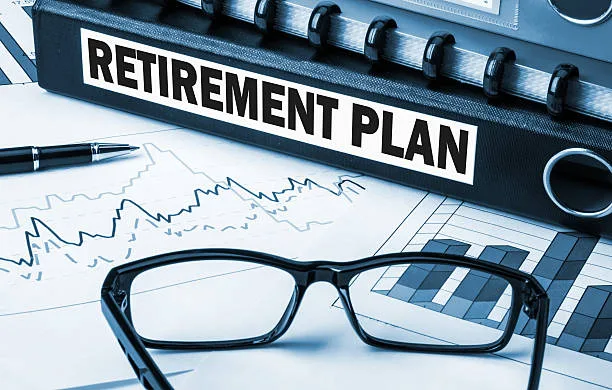What Is Retirement Planning?
- Retirement planning in India refers to the process of determining your financial goals for retirement and creating a strategy to achieve those goals.
- It involves making decisions about how much money you will need for retirement, identifying sources of income, and creating a savings and investment plan to accumulate the necessary funds.
Types of Retirement Plans in India
- Immediate annuity plans
- Deferred annuity plans
- Senior citizen savings scheme
- National Pension System
Why Is Retirement Planning Important in India?

- Retirement planning holds several key benefits. Firstly, it allows individuals to maintain their desired lifestyle during retirement.
- By setting specific financial goals, considering factors such as housing, healthcare, travel, and other expenses, individuals can estimate the amount of money required to support their retirement lifestyle.
- Secondly, retirement planning ensures financial security. By assessing the current financial situation, including income, expenses, assets, and debts, individuals gain a clear understanding of their savings and investment capabilities.
- This assessment helps identify areas for improvement and enables the development of a solid financial plan for retirement.
Why Plan for Retirement?
- Preparing for a Longer Life
- Fight Inflation
- Leave a Legacy
- Maintain Your Standard of Living
Advantages of Retirement Planning
There are several advantages or benefits of retirement planning
1. Financial independence
2. Life expectancy
3. Medical costs
4. Tax benefits
5. Peace of mind
How to plan for retirement in India
To effectively plan for retirement, individuals can follow a step-by-step process:
1.Set Goals
Determine the lifestyle you want to maintain during retirement and estimate the amount of money required to support that lifestyle. Consider factors such as housing, healthcare, travel, and other expenses.
2. Assess Current Financial Situation
Evaluate your current financial status, including income, expenses, assets, and debts. This assessment helps you understand your current savings and investment capabilities and identify areas for improvement.
3. Estimate Retirement Needs
Based on your goals and expected expenses, estimate the amount of money you will need in retirement. Consider factors such as inflation, life expectancy, and potential healthcare costs.
4.Identify Income Sources
Determine potential sources of income during retirement, such as Social Security benefits, pensions, investments, or other forms of passive income. Understanding your income sources helps you plan for any gaps and make necessary adjustments.
5.Saving and Investing
Develop a savings and investment strategy to accumulate the required funds for retirement. This may involve contributing to retirement accounts like 401(k)s or Individual Retirement Accounts (IRAs), as well as investing in other assets like stocks, bonds, or real estate.
6.Risk Management
Assess and manage potential risks that could impact your retirement plan, such as market volatility, inflation, or unforeseen expenses. Consider strategies like diversification and insurance to protect your savings.
7.Regular Monitoring and Adjustment
Regularly review and update your retirement plan to account for changes in your financial situation, goals, or external factors. This helps ensure your plan remains on track and aligned with your objectives.
8.Retirement Opportunities
There are various retirement opportunities available to individuals. Some popular options include:
9.Annuities
Annuities are financial products that provide a guaranteed income stream during retirement. They are typically purchased from insurance companies and offer options such as immediate or deferred payments.
10.Individual Retirement Accounts (IRAs)
IRAs are tax-advantaged retirement accounts that allow individuals to save for retirement. They come in different forms, including Traditional IRAs and Roth IRAs, each with its own tax advantages and withdrawal rules.
Real Estate Investments
Investing in real estate can provide passive income during retirement. Rental properties, Asset backed structured debts or real estate investment trusts (REITs) offer opportunities for long-term wealth accumulation.
Starting a Business
Retirement can be an excellent time to pursue entrepreneurship. Starting a business or engaging in consulting work can provide both financial and personal fulfillment during retirement.
Financial planning for retirement in India
- Increase the volume of investment with increase in income
- Start early investments
- Allocate a fixed percentage of your income towards retirement corpus
- Consider the inflation factor while taking a retirement plan
- Invest in health-insurance and specific plans simultaneously
Factors to consider while planning retirement
- Expected retirement age and investment horizon
2. Risk appetite
3. Current financial situation
4. Spending on retirement needs
5. Asset allocation plan
A rough estimate of the funds you need for retirement
The amount of money you need to retire in India depends on several factors, including your lifestyle goals, expected sources of retirement income, and inflation. To estimate the amount of money you need for retirement, you can use the following formula:
Retirement corpus = (annual expenses X number of years in retirement) / (1 + inflation rate)^(number of years until retirement)
For example, if you expect to spend INR 10,00,000 annually in retirement and you plan to retire in 20 years, with an inflation rate of 6%, you will need a retirement corpus of INR 2.5 crore.
What are the Best Retirement Plans in India?
List of Top 10 Pension Plans in India
- LIC’s New Jeevan Shanti.
- HDFC Life Click 2 Retire.
- SBI Life Saral Retirement Saver.
- ICICI Pru Easy Retirement.
- Max Life Guaranteed Lifetime Income Plan.
- Bajaj Allianz Lifelong Goal.
- Kotak Premier Pension Plan.
Best Investment Plans for Senior Citizens in 2024
1. Senior Citizens Savings Scheme (SCSS)
The SCSS is a government-backed savings scheme tailored for senior citizens, providing them with a secure avenue for regular income through interest payments. Interest is calculated quarterly and deposited to the investor’s account, with rates adjusted quarterly.
- Minimum Amount of Investment: Rs. 1000
- Maximum Amount of Investment: Rs 30 lacs
- Interest Rate: It is 8.20 percent
- Duration: 5 Years
- TDS: Interest income gets taxed, and TDS is applicable if it exceeds Rs 50k.
- Tax Benefits: They are eligible for tax deductions under IT Act Section 80C 1961.
- Premature Withdrawal: Eligible, but subject to penalties. Withdrawals can be made post 1 year of opening the account, with a fine of 1.5% within 2 years and a 1% penalty after 2 years. In case of demise of the account holder before maturity, proceeds are given to the heir or the nominee.
2.Senior Citizen Fixed Deposits
Senior Citizen Fixed Deposits are conventional investment options offering fixed returns, with senior citizens receiving an additional interest rate advantage.
- Minimum amount of Investment & Maximum Amount of Investment: Differs from one bank to another.
- Preferential Interest Rate: Fixed Deposit interest rates range from 3%-7%, with senior citizens earning a maximum of additional interest of 0.5%.
- Interest Payments: Interest can be collected either periodically or upon maturity, with choices available for annual, semi-annually, quarterly, or monthly intervals.
- Duration: This relies on the particular scheme in question..
- Tax Benefits: Tax-saving Fixed Deposits are eligible for deductions under the 1961 IT Act Section 80C.
- TDS: Interest income attracts tax, with a 10% TDS deduction for amounts exceeding Rs 50k.
- Tax: Interest income gets taxed at the investor’s applicable income slab rate for tax.
- Premature Withdrawal: FIxed deposits offer liquidity with premature withdrawal options, subject to penalties. Loans against FDs are also available.
3 Post Office Monthly Income Scheme (POMIS)
POMIS, backed by the Indian government, offers an investment option that has low risk and provides monthly income regularly to depositors through payments of interest.
- Minimum Amount of Investment: Rs 1000
- Maximum Amount of Investment: Rs 9 lacs for each individual, Rs 15 lacs in joint accounts.
- Interest Rate: 7.40 percent
- Duration: 5 Years
- Tax Benefits: No tax deductions.
- TDS: Zero TDS is applicable.
- Premature Withdrawal: Possible after 1 year of opening the account, but subject to penalties. POMIS accounts are transferable between post offices.
4.Tax-Free Bonds
Government infrastructure organizations issue tax-free bonds, providing investors with an annual interest payment that is exempt from taxation, thus making them a secure investment option.
- Tenure: Typically over 10 years.
- Lock-in Period: Bonds can be sold on the exchange before reaching maturity.
- Interest: Interest rates range from 5.5 to 6.5%, and the interest is free from tax.
- Risk Profile: Low-risk with government backing and capital protection.
- Taxation: Gains from selling bonds attract tax per Section 112, with long-term capital gains taxed at 10 percent with zero indexation benefit. Also, it gets taxed at 20 percent with indexation benefits.
5.Real Estate Structured Debt
Real estate structured debt refers to investments in debt securities backed by real estate assets, offering regular interest payments and potentially lower risk compared to direct property ownership. It can be an excellent investment plan for senior citizens because it offers a reliable source of regular income, provides safety and diversification, comes with predictable returns, involves lower risk compared to direct real estate ownership, and is accessible with lower minimum investment requirements.
Additionally, it can be integrated into estate planning strategies for wealth transfer. However, seniors should carefully assess their financial goals and consult with a financial advisor before investing.
- Minimum Amount of Investment: Rs. 10 lacs
- Maximum Amount of Investment: No limit
- Lock-In Period: 36 months
- Tax Benefits: Real estate structured debt investments can avail tax benefits up to Rs. 50, 000.
- Taxation: Interest is taxable
6.Mutual Funds
Mutual funds provide diversified investment opportunities, including equity, debt, and hybrid funds. Senior citizens can select suitable funds based on their financial goals and risk tolerance. Mutual funds offer a range of categories, including hybrid funds, debt funds, and equity funds. Equity mutual funds primarily invest in stocks. Debt funds focus on money market and debt securities. Hybrid funds, on the other hand, allocate investments to equity plus debt securities.
Senior citizens can match their investment goals with the fund’s approach to pick the most fitting choice for their requirements.
- Investment Options: SIP for regular investments and SWP for regular withdrawals.
- Systematic Withdrawal Plans (SWP): SWP permits investors to make regular withdrawals of fixed or variable amounts, with capital gains tax applied solely to the withdrawn sum.
Table for Best Investment Plans for Senior Citizens
| Investment Option | Minimum Amount of Investment | Returns |
| Real estate structured debt | Rs. 10 lacs | 12 to 20% |
| Mutual Funds | Rs. 100 | 12 to 15% |
| SCSS | Rs. 1,000 | 8.20% |
| Senior Citizen Fixed Deposits | Vary across banks | 8.20% |
| POMIS | Rs. 1500 | 7.40% |
| Tax-free Bond | NA | 5.5 to 6.5% |

Conclusion:
Retirement planning is a vital process that ensures financial security, independence, and peace of mind during an individual’s retirement years. By taking control of their financial future and implementing effective strategies, individuals can adapt to changing circumstances, enjoy a fulfilling retirement lifestyle, and explore various retirement opportunities.
Whether in India or elsewhere, retirement planning empowers individuals to secure their future, leave a lasting legacy, and make the most of their golden years. Seek professional guidance when necessary to optimize your retirement plan and make informed decisions along the way. Start planning today for a prosperous and worry-free retirement tomorrow.
Assetmonk takes great pride in leading the alternative investment landscape by providing our valued investors with an extraordinary assured Internal Rate of Return (IRR) of 17% and beyond. Our investment opportunities are backed by the inherent security of real estate, assuring our investors of a secure future. Join us as the next smart investor by starting with a minimum investment of 10L and unlock a world of potential financial growth. Experience the smartest way to invest with Assetmonk and embark on a journey towards a prosperous future.

 Listen to the article
Listen to the article
